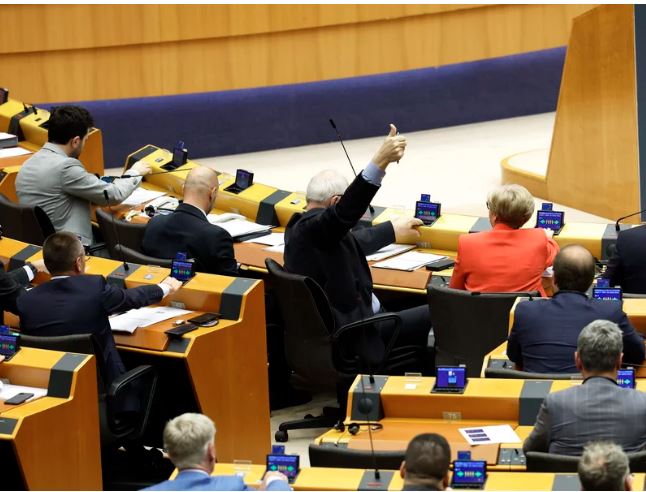European Union lawmakers have given their approval to a significant overhaul of the bloc’s migration laws, aiming to resolve years of discord over the management of unauthorized entry and strip the far-right of a divisive campaign issue ahead of June elections.
Through a series of 10 votes, members of the European Parliament endorsed the regulations and policies constituting the Pact on Migration and Asylum. These reforms tackle the challenging question of migrant responsibility upon arrival and whether other EU nations should be compelled to offer assistance.
The proceedings were briefly disrupted by a small but vocal group of demonstrators in the public gallery, donning shirts emblazoned with “this pact kills” and chanting “vote no!”
Now, the 27 EU member states must also endorse the reform package, possibly through a vote in late April, before it can take effect. European Parliament President Roberta Metsola, a former lead lawmaker on migration pivotal in advancing the reform package, celebrated the milestone by posting “History made” on social media.
German Interior Minister Nancy Faeser hailed the outcome as a “significant and crucial success.” She emphasized the comprehensive nature of the package, which emerged after arduous negotiations spanning several years.
The plan was crafted in response to the influx of 1.3 million individuals, primarily fleeing conflict in Syria and Iraq, who sought refuge in Europe in 2015. The resulting strain on the EU’s asylum system, overwhelmed reception centers in Greece and Italy, and erected barriers in northern European countries to halt entry.
However, satisfaction with the new policy response to one of Europe’s most pressing political crises is scarce. Even lawmakers involved in drafting sections of the reform package expressed reluctance to endorse it in its entirety.
The new regulations encompass contentious measures, including the potential collection of facial images and fingerprints from children as young as 6 and the possibility of detention during screening. On a positive note, countries may be obligated to assist EU partners by providing housing for asylum-eligible individuals or covering the costs of accommodations elsewhere.
While mainstream political parties sought to secure agreement on the pact ahead of the upcoming elections, migrant and human rights groups largely criticized the reform package. They contend that it fails to provide sustainable solutions for those seeking safety and could exacerbate human rights violations across Europe.
The central question following full endorsement of the regulations will be whether member countries will implement them fully and whether the European Commission will enforce the rules, given its historical avoidance of exacerbating political crises.



